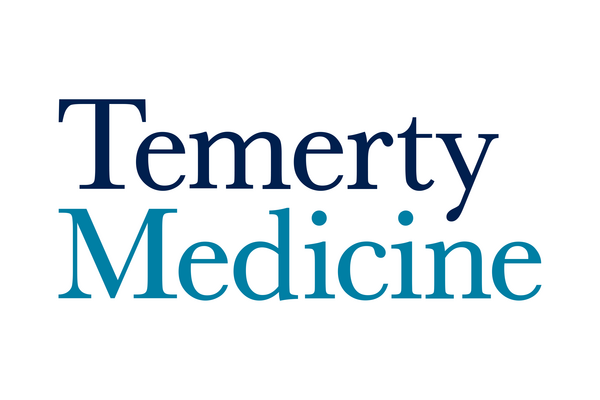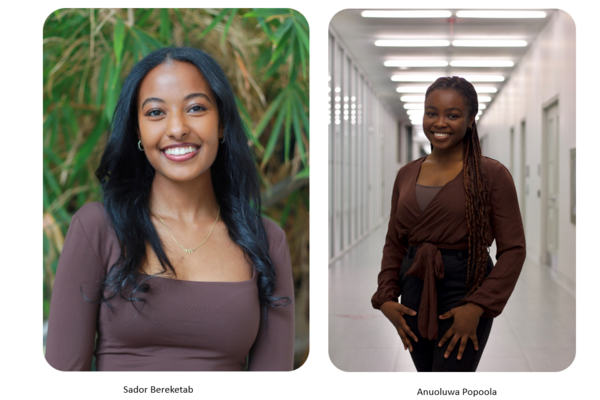Main Second Level Navigation
Meet Team AstrØ
The 2023-2024 O-week Executive Team
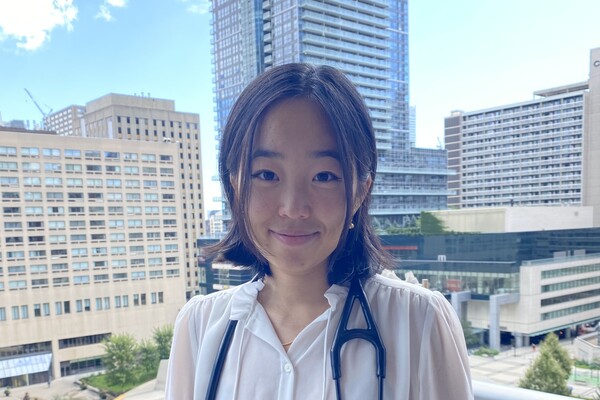
Why did you choose University of Toronto for medical school?
University of Toronto has always been one of my top choices for medical school, and being able to study here has been a dream come true. I’ve always been drawn to U of T due to its strength in clinical teaching, the multitude of research opportunities, and the ability to learn in some of the world’s best teaching hospitals. After receiving my acceptance, I was warmly welcomed by upper year medical students and quickly met compassionate and intellectually curious peers. The vibrant community at U of T is second to none, and I am reminded of how lucky I am to study here every day.
Additionally, Toronto is a vibrant city filled with great sights, delicious food, and lovely people. Being able to call this city home has been exciting, and I look forward to exploring more of it over the next few years!
Was there anything you wished you had done differently to get ready for medical school?
Prior to medical school, I wish I dedicated more time to activities that I enjoy, whether that be reading good books, jogging, traveling, or attending concerts of artists that I love. As a student, it is easy to get caught up on deadlines and due dates. Looking back, however, I now understand the importance of prioritizing your mental well-being – no matter where you are in life. Nowadays, I try to do something I enjoy every day. It can be something as small as buying an iced matcha latte to something as cool as planning a trip for winter break! That way, there’s always something exciting to look forward to in addition to medicine.
What does the (post-pandemic) day in the life of medical student look like?
In first and second year, we have four days with classes and one rest day each week. During the school days, I like to eat a hearty breakfast, attend my classes, complete any homework assignments, and take the time to review what we’ve learned. I also try to make time to exercise, cook, and hang out with friends and family.
The rest day is a wonderful opportunity to recharge and try new things. For me, this can include catching up on some much-needed sleep, going to a new café in Toronto to study, completing some schoolwork, meeting up with old friends, or shadowing. The possibilities are endless, and I am grateful to have this time during the week to do what is best for me both physically and emotionally.
Which resources or student support services (such as academic advisors, counsellors, etc.) would you advise new students to use to ensure a smooth transition to medical school?
The Office of Learner Affairs (OLA) is an amazing resource that I would recommend to new medical students! Transitioning to medical school can be tough and luckily, OLA can offer help in multiple ways. For instance, they offer personal counselling, academic guidance and support, and career counselling. As someone who wanted to learn more about different medical fields, OLA’s career counselling was extremely helpful in helping me learn about different specialties, the requirements that applying to each specialty had, and disproving any myths. I’ve also heard amazing things about their personal counselling and their academic supports and am grateful there is a resource like them for medical students.
What aspect of medical school is the most challenging? What is most enjoyable or rewarding?
For me, the most challenging aspect of medical school is learning how to efficiently process, understand and retain large amounts of clinical information. In first year, we learn and are tested on a different unit every two to three weeks. This means that we must absorb a lot of in-depth information about one topic and move onto another one quite frequently. While this is no easy task, I’ve learned some important techniques such as focusing on key messages and adjusting my study schedule based on what is needed for each unit that have helped me succeed.
The most enjoyable aspect of medical school is meeting new people (whether that is peers, preceptors, instructors, or patients) and learning more about their stories. Their perspectives have taught me so much about medicine and about life. It is moments like these where I reflect on how excited I am to be a physician and how privileged I will be to continue learning about the stories of my own patients.
Did you have a “lightbulb moment” where you realized pursuing a career to become a doctor was the right choice?
Rather than having one singular “lightbulb moment,” I believe that there have been many experiences that have shaped my desire to become a physician. From first learning about fascinating organ systems in high school biology to caring for a loved one with a degenerative disease to volunteering as an emergency first responder in undergrad, different experiences have shown me the different sides of medicine that I enjoy –whether that is the ability to learn about the intricacies of the human body, provide comfort and advocate for patients, and work with diverse groups of individuals. These experiences have also taught me the importance of resilience, curiosity, patience, and kindness – characteristics that I hope to consistently emanate in my future practice.
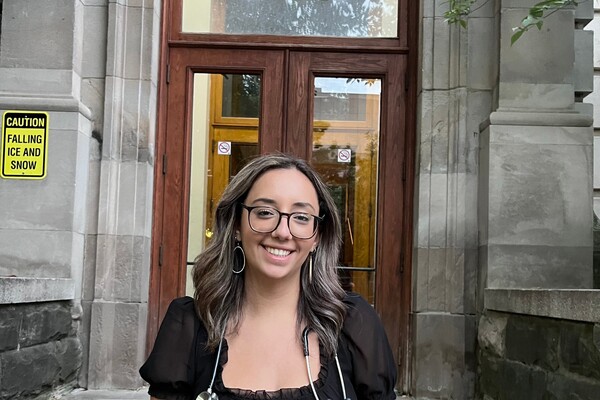
Why did you choose University of Toronto for medical school?
Coming from Kingston for undergrad, living in the throes of a big city like Toronto is a dream for me — the food scene and hustle has been so exciting. Toronto also gives you access to some of the greatest hospital networks in the world, and I've loved the academic and clinical opportunities it brings.
Was there anything you wished you had done differently to get ready for medical school?
I wish I had spent more time connecting with myself and more of my hobbies and interests outside medicine. There are many activities and experiences I want to try, but I feel now that I have less time. Making time for these in medicine has been important so that my personal development does not stall in the midst of school.
What does the (post-pandemic) day in the life of medical student look like?
Generally, I go to my assigned classes from 9-4/5 four days a week. On the class-heavy days I either go to a library after and study or go home and relax—depending on when our next exam is and how much energy I have. On Wednesdays and the weekends, I’ll try to study most of the day and spend the evenings doing something more social, or something I enjoy.
Which resources or student support services (such as academic advisors, counsellors, etc.) would you advise new students to use to ensure a smooth transition to medical school?
I’ve received personal counselling through the OLA, and I think it’s a great resource that more medical students should take advantage of. Unlike at my undergrad the counselling isn’t just for periods of personal crisis, it can be used to access CBT and other forms of therapy support.
What aspect of medical school is the most challenging? What is most enjoyable or rewarding?
The most challenging is the frequency of exams and the volume of content. Falling behind is easy. The most enjoyable has been creating new bonds with my classmates, who I’ve found to be extremely interesting and dynamic people.
Did you have a “lightbulb moment” where you realized pursuing a career to become a doctor was the right choice?
Integrated Clinical Experience (ICE) has created several of these lightbulb moments for me. Every time I’m able to talk to a patient and relate the information I hear to the content we learned in class; I realize how much I love connecting with people and using the scientific knowledge I’ve amassed to solve clinical puzzles.
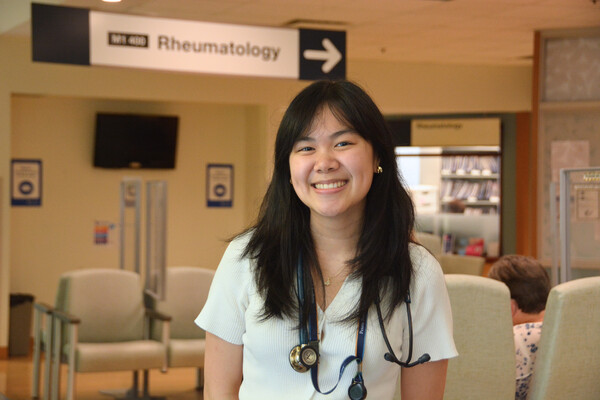
Why did you choose University of Toronto for medical school?
I was fortunate to be accepted to every school I applied for in Ontario, including McMaster, UOttawa, Western, and Queens. I chose Toronto in part because of my family. I grew up in Willowdale and it has been a dream of mine to return home and practice in the community that raised me. It is also important that I explore every facet of being a physician in my journey as a medical student. I wanted exposure to physicians who are health leaders, academic researchers, community advocates, and excellent clinicians. One year later, I am so grateful to be learning from the best. It also helps that we have great ice cream!
Was there anything you wished you had done differently to get ready for medical school?
I wish that I had reflected more as a new medical student. In many ways, the goals of medical school and undergrad differ greatly. While there is no shortage of opportunities to be involved, we have such limited time in the program. I challenge us all to reflect on what brings meaning to our lives, the people who are important to us, and the activities that we enjoy. There is great focus on what residency to pursue -- anesthesiology or dermatology, general practice, or surgery. Recently I have been more concerned with what kind of doctor I want to be -- kind, patient, and brave.
What does the (post-pandemic) day in the life of medical student look like?
Every day is different, and I’m excited by the richness in my schedule. During the day, I’m on campus or at Sunnybrook attending class. I spend my evenings doing research or playing intramural water-polo. At least once a week I’m home cooking dinner with my family. On the weekends, I’m either preparing for an exam or hosting friends from out of town. A couple times each year, I am traveling to present my work at conferences. I was most recently in Quebec City!
Which resources or student support services (such as academic advisors, counsellors, etc.) would you advise new students to use to ensure a smooth transition to medical school?
I count myself lucky to have access to excellent resources at U of T. The Office of Learner Affairs (OLA) provides both academic and personal counseling sessions. I have personally enjoyed participating in the mentorship programs hosted by the Advancement and Alumni Relations Office. I would encourage students to lean on our strong community. I have found that upper year students, residents, and attendings alike are happy to advise and guide new students as they navigate their journey in medicine.
What aspect of medical school is the most challenging? What is most enjoyable or rewarding?
Before entering medical school, I worried about the academic rigor of the program. Now in my second year, I struggle more with balancing and retaining my many interests in and out of medicine. In undergrad, I loved teaching (I was a TA), mentorship, and volunteering. I continue to work on balancing my existing priorities with my new interests in research, health leadership, and EDI work.
Did you have a “lightbulb moment” where you realized pursuing a career to become a doctor was the right choice?
Growing up, I never imagined I would become a doctor. My first job was as a research assistant in the Engineering Physics department at McMaster University. Coming out of high school, I was choosing between offers at Queen’s Commerce and Western’s combined medical science and Ivey business program. After one year at Western, I transferred to McMaster’s health sciences program, and it was only in my third year that I started to seriously consider medicine.
At the time, I was enrolled in an experiential course teaching motivational interviewing techniques. In Communication Skills, we learned to consult patients and navigate difficult conversations ranging from mental health to LGBTQ issues. It was through these encounters that I started to reframe medicine as the practice of active listening. I have always been most interested in meeting people and hearing their stories -- this is when I’m happiest.
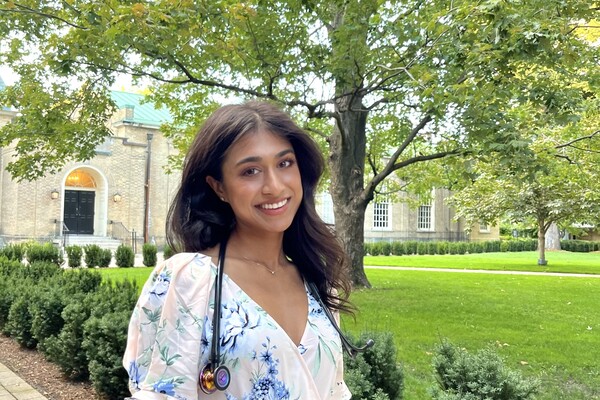
Why did you choose University of Toronto for medical school?
The University of Toronto had been my home for undergrad and my MSc. After spending 7 years in the city and exploring the campus, I knew that I wouldn’t want to pursue my medical education anywhere else. The extensive research and clinical network that Temerty Medicine beholds amid the vibrant downtown core is one that I was eager to immerse myself in. Also, being able to interact with the diverse patient communities that Toronto has will be critical towards becoming a holistic and compassionate physician.
Was there anything you wished you had done differently to get ready for medical school?
One thing I wish I had done differently would’ve been developing more discipline and practicing more self-care habits. I started medical school after completing a 3-year MSc., during which time I did not have a strict schedule as my lab hours were contingent on patient sample availability and the duration of my experiments. It was difficult for me to start following a regular routine and I think if I had taken some time to figure out a balanced schedule, then I would have had an easier transition into medical school.
What does the (post-pandemic) day in the life of medical student look like?
The typical day in the life of a medical student starts with lots of caffeine and morning in-person class, whether its anatomy, lectures, a seminar on longitudinal health themes, or clinical skills. This is usually followed by lunch with friends and then an afternoon class. Evenings are then dedicated towards group study in a café, library, or student space, as we all try to commit to memory all the divisions and cords of the brachial plexus. Afterwards, I personally like to either get a workout in or make dinner. I end off the night attending to extracurricular commitments like research, class council responsibilities, or completing any assignments we have due for the week. Not all days are this organized or planned out. Some days we have more personal time for shadowing or exploring the city with friends, and some days we barely get any sleep, but overall, the day in the life of a medical student is one that I’m happy to live every day.
Which resources or student support services (such as academic advisors, counsellors, etc.) would you advise new students to use to ensure a smooth transition to medical school?
The Office of Learner Affairs (OLA) and Foundations lead – Dr. Anne McLeod, are excellent support networks to reach out to. I have personally reached out to OLA or receive career guidance and therapy. OLA has compassionate and skilled professionals to help students navigate the many challenges of medical school and I am so grateful for their support. Dr. Anne McLeod is one of the kindest physician/teachers I have met and has been very helpful when students need extra clarification about academic requirements throughout Year 1.
What aspect of medical school is the most challenging? What is most enjoyable or rewarding?
The aspect of medical school that is the most challenging would probably be forming your own identity and values and staying true to them. Medical school draws in individuals from all over the country with incredibly diverse experiences, lifestyles, and skills. It can be overwhelming and anxiety-inducing seeing others making an Anki-deck for every ME, or doing 20 research hours per week, or shadowing every week. It can be challenging to remind yourself to pursue opportunities and create a lifestyle that works best for YOU and helps you achieve your full potential!
One of the most rewarding aspects of medical school is that amazing feeling when you’re able to connect concepts from class to clinical applications while shadowing or during ICE. The self-confidence boost helps me fight the imposter syndrome and drives my motivation to learn more! The second most enjoyable aspect is being able to form everlasting bonds with friends who are enduring similar struggles with you but are also there for every highlight and happy moment.
Did you have a “lightbulb moment” where you realized pursuing a career to become a doctor was the right choice?
The “lightbulb moment” for me that confirmed for me that I made the right choice was when I shadowed a 14-hour surgery from 8:30 am – 10:30 pm with Dr. Sav Brar at Mount Sinai Hospital, and only felt exhilaration and wonder when I scrubbed out. I remember thinking to myself in that moment, I want to do this again, and again, and again.
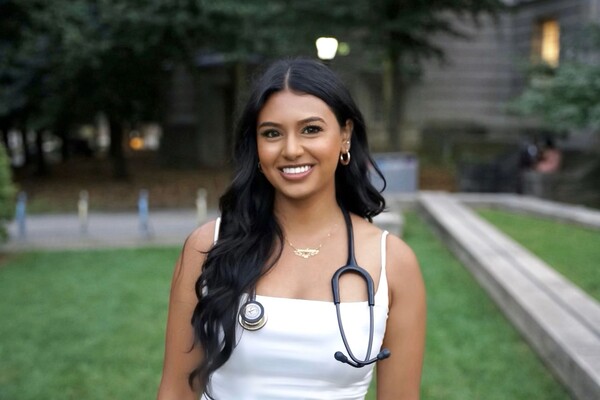
Why did you choose University of Toronto for medical school?
U of T Med has always been a dream for me, and being here, I can promise that it has truly become a dream come true! Firstly, there is never a dull moment in Toronto with concerts, museums, art galleries, and its vibrant food scene. You’ll always find something to do and amazing people to do it with! Secondly, the community at U of T Med is incredible. You'll find some of the most accomplished and supportive classmates, mentors, and faculty members here. They are, without a doubt, what makes medical school such a special experience, so don't hesitate to reach out and get to know them! Lastly, the learning opportunities provided here are unparalleled. You'll have the privilege of shadowing and learning from leading physician experts at some of the world's best hospitals. I couldn't be happier with my decision to come to U of T!
Was there anything you wished you had done differently to get ready for medical school?
One thing I would have done differently is change the way I viewed medical school earlier on. Instead of regarding it as 'school,' I would have treated it as the foundation for my career in medicine. While it may sound obvious, it's easy to become engrossed in day-to-day coursework and exams without connecting them to the broader picture of becoming a compassionate and skilled clinician. Approaching medical school with a career-oriented mindset from the beginning would have motivated me to actively seek out meaningful clinical experiences, prioritize practical skills, and keep the goal of providing compassionate and excellent patient care at the forefront of my education right from the start. Although many of us eventually realize this, having this mindset shift from day one would have made the journey even more purposeful and fulfilling.
Which resources or student support services (such as academic advisors, counsellors, etc.) would you advise new students to use to ensure a smooth transition to medical school?
Navigating medical school can be quite the journey, and it's important to remember that you don't have to go through it alone! Reach out to your friends, classmates, and family; building a strong support network can truly work wonders. I also strongly recommend taking full advantage of the incredible resources and support services available at Temerty Medicine. The Office of Learner Affairs is a goldmine! They offer services like career counseling, personal counseling, and academic coaching. The SHINE team at Temerty Medicine consists of fellow medical students who serve as Wellness Ambassadors and are here to support you. Temerty Medicine also offers fantastic mentorship programs, so be sure to keep an eye out for those opportunities. Our faculty members are not just educators; they are also excellent mentors, so don't hesitate to reach out to them for guidance. In a nutshell, lean on your support network, take advantage of these resources, and seek out mentors. They will make your journey through medical school much smoother.
What aspect of medical school is the most challenging? What is most enjoyable or rewarding?
The most challenging aspect of medical school, in my experience, has been striking that delicate balance between handling academic demands and caring for my own well-being. It's a juggling act, trying to study for exams, grasp complex medical concepts, and still find time for self-care and maintaining a life outside of medicine. Fortunately, we have access to various student support services that can help us develop effective time management strategies when needed.
On the brighter side, my favorite part about medical school has been cherishing the little things. From struggling through my first intubation to forging connections with patients, celebrating milestones like birthdays, finishing exams, and even simply grabbing coffee with friends during lecture breaks—these are the experiences that have made my time in medical school memorable and enjoyable.
Did you have a “lightbulb moment” where you realized pursuing a career to become a doctor was the right choice?
It wasn't a single lightbulb moment but rather a culmination of experiences that solidified my interest in medicine. During my undergraduate years, I joined Empowerment Squared to tutor and mentor youth from disadvantaged backgrounds, including newcomers to Canada, refugees, and students from low-income families. This role exposed me to the multifaceted challenges they faced, both inside and outside the classroom.
One significant moment was a conversation with a participant who expressed doubts about pursuing a career in medicine due to a lack of representation and exposure to the field. Although I was able to reassure him and connect him to resources like Temerty Medicine's Summer Mentorship Program, this experience underscored the complex social barriers to education faced by underprivileged groups and emphasized the need to improve equity, diversity, and inclusion in the medical field. Additionally, I observed health inequities among these participants and initiated mindfulness and fitness sessions to address these disparities and promote health literacy. These experiences deepened my commitment to serving marginalized groups and addressing the intertwined challenges of health and social disparities.
To further explore this career interest, I actively engaged in community advocacy, conducted clinical research, and volunteered with vulnerable communities, all of which solidified my desire to pursue medicine. As a future physician, I hope to leverage the platform and privilege that this profession offers to advocate for health equity. Recognizing that meaningful change requires amplifying the voices of those from marginalized groups, I aspire to create pathways that foster greater equity, diversity, and inclusion within the field, ensuring that our healthcare community reflects the rich diversity of Canadian society.

